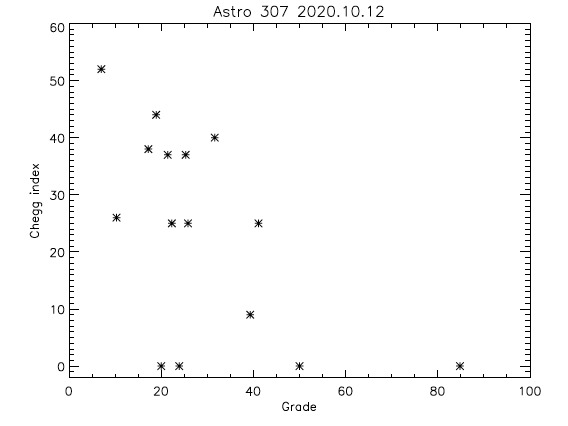Academic Misconduct in Physics: Completely
Counterproductive
Cheating in physics is not only unethical, it
counters the very reason one studies physics. It is
definitely not a path to physics success
to copy or draw from solution sets. If I were to
take someone else's results, put my name on them and submit them
to a research
journal as my own work, I would be guilty of professional
misconduct and face consequences both from the University and
from the journal if
not a number of journals. Once a scientist loses
credibility, it is difficult to regain it. University
students, as future professionals,
should be held to the same standard.
I spoke with Brad Peterson, a co-author
of our textbook ("Foundations of Astrophysics"), and he stated
that "using the answer
key for homework is like sending someone to the gym to lift
weights instead of going in person". Just like strength
does not come at the
moment weights are lifted over one's head, but rather in a
continuous process starting from the struggle to pick them up
from the ground,
learning does not come from seeing the final answer, but rather
in the struggle to learn the thinking behind each step and
principle for each
part of a problem. This is why seeing the complete answer
all at once may save time to get homework done to a deadline,
but is a terrible
way to learn, and does not lead to retaining knowledge.
The consequences come at midterm and final exam time.
I noticed a strong anti-correlation
between "Chegg index" and midterm performance in my class
in Autumn 2020. See this plot,
which shows the "Chegg Index" vs. grade on the first
midterm. I graded 18 homework problems for the class, and
gave scores of 3 points for verbatim copying (plagiarism), 2
points for paraphrasing, 1 point for some similarity and 0
points for
complete originality (including a wrong answer). Total
verbatim copying for all the problems is a Chegg index of 54.
I normalized scores in case students did not turn in all of the
questions.

If I were to take someone else's
results and put my name at the top to claim them as my work, I
would be guilty of professional
misconduct. I would get in trouble with my employer, my
professional society and any research journal where I would try
to
publish the results. I could lose my job and be
blacklisted from my field, ending my career. Once a scientist
loses credibility, it is very
difficult to reclaim it. University students, as future
professionals, should be held to the same standard.
Companies like Chegg, Quizlet and
CourseHero are set up to make money. They are not
altuistic organizations interested in students
learning. The answers are crowd-sourced and prone to
errors and irregularities which are red flags to teachers.
Their solutions are
often not the best way to to do problems, and carry the danger
that students will learn the wrong, mistake-prone way to arrive
at
solutions. It is far better to ask for help. A good
teacher will ask leading questions so that you go step by step
on your own to learn the
principles behind solving problems. I do my best to
provide that for all of my students, and am happy to help all of
my students out.
If you are studying physics beyond the
first year, it must be because you want to go on in the
field. It is a contradition to cheat
to attempt to get a qualification which you cannot show in
practice. If you have to look up answers to every little
problem, you cannot
apply the concepts to more complex problems, and you will not
succeed competing against people who really can solve problems
because they
know the concepts and techniques that you do not.
In addition, science is an endeavor
which searches for the truth, and relies on truthful reporting
to make advances. The lack of
integrity required for cheating will also make it very difficult
to have integrity in research -- which will make for a quick
exit from
science. Once a scientist (or science student) gets a
reputation for cheating, it is difficult to reclaim the respect
of one's peers. This
will make it difficult to get papers accepted, win grants or
convince other people to work with you, much less accept your
ideas.
If you are having problems in physics,
step back and learn the basics. It is possible to learn
them. Repeat courses if necessary --
or apply your skills in some other field. Physics, like
sports, music and languages, is built on a tower of knowledge
and ability. There is
no way to master advanced concepts without mastering the basics,
and no way to cheat yourself to the top without a 100% chance of
failure.
